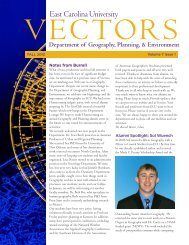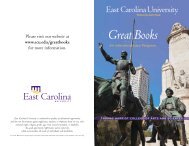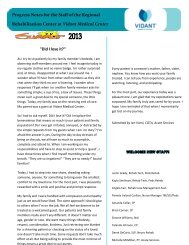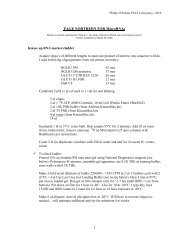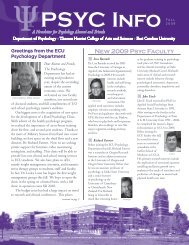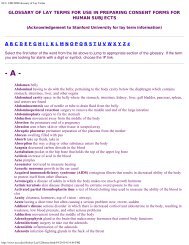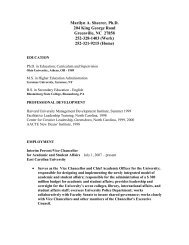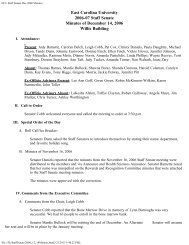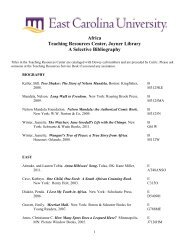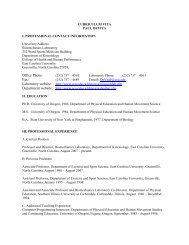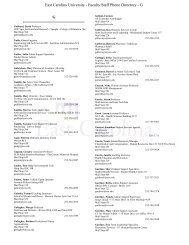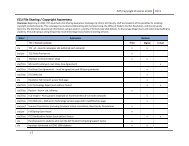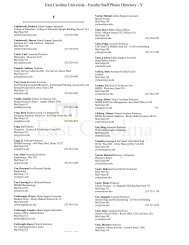By Rachel Castro, ECU News Services - East Carolina University
By Rachel Castro, ECU News Services - East Carolina University
By Rachel Castro, ECU News Services - East Carolina University
You also want an ePaper? Increase the reach of your titles
YUMPU automatically turns print PDFs into web optimized ePapers that Google loves.
TECS ConnECTS<br />
<strong>News</strong> and Notes from the College of Technology and Computer Science<br />
teCS NEWS<br />
Keihin <strong>Carolina</strong> Systems Technology<br />
provides scholarship funds<br />
Keihin employees visiting the college.<br />
Keihin <strong>Carolina</strong> Systems Technology<br />
(K-CST) of Tarboro, NC, has provided<br />
a scholarship fund for students<br />
who will transfer from Edgecombe<br />
Community College to the College<br />
of Technology and Computer<br />
Science at <strong>East</strong> <strong>Carolina</strong> <strong>University</strong>.<br />
Chris Eckhardt, Vice President and<br />
Chief Operating Officer of Keihin’s<br />
Tarboro, NC manufacturing plant,<br />
has established this fund to facilitate<br />
regional growth by helping students<br />
continue their education and remain<br />
employed locally. Eckhardt said,<br />
“We intend to partner with both<br />
WHAT’S INSIDE:<br />
behm Spends time in Singapore ....2<br />
Message from the dean ....................3<br />
eCu research to inform State<br />
decisions on Highway<br />
Construction ................................... 4<br />
of these colleges to help provide<br />
an educational pathway for local<br />
students who want to pursue a<br />
technology based education.”<br />
This scholarship fund is intended for<br />
students who are from Edgecombe<br />
County that show interest and<br />
promise in technology or engineering.<br />
After completing their first 2 years<br />
at Edgecombe Community College<br />
and earning an AAS degree, students<br />
that are awarded scholarships would<br />
complete their BS degree with the<br />
College of Technology and Computer<br />
Science in programs within the<br />
pCC, eCu sign Agreement<br />
regarding engineering transfer ...5<br />
department news .......................6 & 7<br />
Major Gifts office ............. back cover<br />
WWW.teCS.eCu.edu<br />
FALL/Winter 2011<br />
Department of Engineering or<br />
the Department of Technology<br />
Systems. As Keihin announced<br />
their intentions, Dr. David White,<br />
Dean of the College, began<br />
working with Dr. Deborah<br />
Lamm, President of Edgecombe<br />
Community College, and her<br />
staff, to develop a detailed plan<br />
for this gift to insure maximum<br />
benefit for students, K-CST and<br />
both educational institutions.<br />
“It’s important to develop<br />
local resources for local<br />
companies,” said White,<br />
“The College is committed<br />
to supporting economic<br />
development in eastern North<br />
<strong>Carolina</strong>, and this generous gift<br />
from K-CST will help develop<br />
talent that is already a part of the<br />
region and will stay in the area to help<br />
develop and grow new industries.”<br />
This scholarship will provide<br />
partial funding for two students<br />
per semester while they attend the<br />
College of Technology and Computer<br />
Science. First awards will be made<br />
in the spring of 2012 for students<br />
entering <strong>ECU</strong> in the fall of 2012.<br />
Keihin has also recently provided<br />
funding to support an instrumentation<br />
lab in the Science and Technology<br />
Building on campus at <strong>ECU</strong>.<br />
SponSored by
teCS NEWS<br />
Behm Spends Time<br />
in Singapore<br />
In April 2010, Mike Behm, Associate Professor<br />
of Occupational Safety in the Department of<br />
Technology Systems, received a phone call from a<br />
colleague at the National Institute for Occupational<br />
Safety and Health (NIOSH) about a group of<br />
workers hanging over the edge of a 10 story<br />
building hoisting a lawnmower up to the roof.<br />
Behm had been working with NIOSH for the past<br />
five years on its Prevention through Design and<br />
Safe Green Jobs Councils. That April 2010 phone<br />
call led to a question that then led to research –<br />
how are green roofs being safely designed and<br />
integrated into the built environment so that<br />
workers can build and maintain them. Through Green roof installation crew.<br />
a small grant from Virginia Tech, Behm visited<br />
19 green roofs in the US in 2010 to observe designs and understand necessary installation and maintenance tasks.<br />
During the project’s literature review, he discovered Singapore’s Centre for Urban Greenery and Ecology’s (CUGE)<br />
Safe Design Guideline for rooftop Greenery, and its fellowship opportunities. Singapore is transforming itself from a<br />
“Garden City” to a “City within a Garden”. Skyrise greenery, as it is labeled there, is quickly becoming a standard part<br />
of the built environment. recognizing that workers must safely maintain vegetation and that the design of the built<br />
environment influences worker behavior, CUGE published its safe design guidelines in 2010.<br />
Mike spent two months this past summer as a research Fellow at CUGE in Singapore studying safety aspects of<br />
skyrise greenery systems, which included roofs, walls, and ledges. Working with researchers and skyrise greenery<br />
professionals, he conducted site visits and<br />
interviewed design professionals and landscape<br />
companies about their experiences in working<br />
with green roofs and walls. He is currently<br />
helping revise standards for rooftop greenery<br />
and assisting to develop new standards for<br />
the safe design and management of vertical<br />
greenery systems. The site visits allowed Behm<br />
to observe how worker safety and access is<br />
integrated into skyrise greenery systems at<br />
the design stage. For example, an access way,<br />
French doors, and a guardrail camouflaged<br />
by the plants were designed into a vertical<br />
greenery system allowing easy and safe<br />
worker access. The result was a green wall that<br />
was properly maintained and provided the<br />
designer’s vision on aesthetics for the building<br />
occupants. Behm said, “When safe design<br />
thinking is integrated into the design phase of<br />
projects, advances will occur for worker safety<br />
across the life cycle but may very likely also<br />
impact cost, quality, and schedule.” But even<br />
A steep green roof at a university.<br />
more so than the research, it is the experience<br />
of living in another country, even if for a short<br />
time, that gives one a different perspective and adds life value to bring back to the classroom and campus. Behm<br />
says, “<strong>By</strong> listening to and experiencing unique perspectives, you are better able to critique your own perspective for<br />
continual improvement.”<br />
Behm returned to Singapore to deliver two workshops at CUGE and a keynote presentation at the Workplace<br />
Safety and Health Council Construction Safety Forum in late November. Additionally, a seminar was held on campus<br />
and is available via <strong>ECU</strong>’s Global Classroom as a live streamed lecture.<br />
2 teCSConneCtS • FALL/WINTEr 2011
teCS NEWS<br />
Message from the Dean<br />
You Make A Difference!<br />
On October 6, 2011, I had the opportunity to attend<br />
the inauguration of Dr. Tom ross, new President of<br />
North <strong>Carolina</strong>’s public universities. It was inspiring<br />
to see past Presidents Bill Friday, Dick Spangler,<br />
Molly Broad and Erskine Bowles at the event. In his<br />
address, Dr. ross mentioned several key points that<br />
will help shape the direction for <strong>ECU</strong> and the other<br />
15 institutions in the system. I was pleased to hear his<br />
comments since I think we are poised to excel as a<br />
<strong>University</strong> and as a College under his direction.<br />
Dr. ross said that it is our time to redefine<br />
ourselves and decide how to retain the essence of<br />
what we do best – teaching, research, and public<br />
engagement – but to do so in new and different ways<br />
that are relevant to the lives of our people and that<br />
add real value to the state and the nation. Dr. ross<br />
went on to identify six key focus areas.<br />
1. We must start with a new and heightened focus on<br />
academic success and academic accountability.<br />
2. We must find new ways to help finance our programs<br />
and our operations.<br />
3. We must become more innovative and nimble.<br />
4. We must refine our academic priorities and identify<br />
programs of excellence. We cannot be everything to<br />
everybody.<br />
5. We must recognize our duty to serve all students,<br />
not just the traditional 18-year-old recent high school<br />
graduate.<br />
6. We must do even more to unleash our faculty’s<br />
brainpower and creativity in a more strategic,<br />
targeted fashion to help solve some of our state’s<br />
and our world’s toughest problems.<br />
These actions called for by our new President are<br />
ones that our College can directly impact in a positive<br />
way. The College continues our focus on “students<br />
first” and supporting our students and faculty as they<br />
work to improve our region’s communities and the<br />
state, particularly our efforts to enhance economic<br />
development and prosperity. We will continue to find<br />
new ways to finance our programs. Many of you reading<br />
this are contributing significantly to that goal. We serve<br />
our traditional undergraduates who arrive on campus<br />
david White, dean, College of technology and Computer Science,<br />
with president ross at Spring Commencement.<br />
right after high school, but we also provide access to<br />
educational opportunities for those in the workforce and<br />
the military through our excellent distance education<br />
programs. We are working with our community college<br />
partners to ensure that clear pathways are available for<br />
transfer students who want to access our programs.<br />
Our future, often called the “new normal,” will find us<br />
refining our focus on our programs of excellence, and<br />
looking even more carefully at every dollar we spend<br />
to ensure we are doing the most with our diminishing<br />
state resources. Overall, our College will be successful<br />
as long as we remain committed to contributing to the<br />
common good, developing new leaders, and serving in<br />
ways that enhance the quality of life for the people in our<br />
communities. In fact, I think you will see evidence of all<br />
these commitments in this newsletter!<br />
Let me close by inviting you to visit our new website at<br />
www.ecu.edu/tecs and learn about all the great things<br />
going on in the College! Take a moment to send us<br />
updated information on where you are and how you are<br />
doing. We want to stay in touch with you because YOU<br />
MAKE A DIFFErENCE!<br />
I hope you have a great holiday season!<br />
Sincerely,<br />
David M. White<br />
Dean<br />
Did You Know?<br />
<strong>ECU</strong> mentioned among top 10 schools for software engineering at http://education-portal.com/articles/Top_Schools_<br />
for_Software_Engineering.html<br />
Software engineering program selected as Best Buy at http://www.geteducated.com/online-college-ratings-and-rankings/best-buy-lists/online-engineering-masters<br />
Computer networking Management program selected as Best Buy at http://www.geteducated.com/onlinecollege-ratings-and-rankings/best-buy-lists/online-masters-computer-science-it-degree<br />
teCSConneCtS • FALL/WINTEr 2011 3
teCS NEWS<br />
<strong>ECU</strong> Research to Inform State Decisions on<br />
Highway Construction <strong>By</strong> <strong>Rachel</strong> <strong>Castro</strong>, <strong>ECU</strong> <strong>News</strong> <strong>Services</strong><br />
A two-year research project at<br />
<strong>East</strong> <strong>Carolina</strong> <strong>University</strong> is turning<br />
up information that could help North<br />
<strong>Carolina</strong> tone down the roar of tires on<br />
busy highways.<br />
A $218,000 grant to the Department<br />
of Construction Management is<br />
funding a study of tire and pavement<br />
noise in the state. The findings,<br />
said Dr. George Wang, the principal<br />
investigator of the project, will help<br />
guide state decisions about the best<br />
pavement for road building in the<br />
state.<br />
eCu graduate richard Shores prepares<br />
a noise meter for a road test. Shores<br />
assisted in the highway noise research<br />
while a graduate student at eCu.<br />
(photos by Cliff Hollis)<br />
“This work has laid a cornerstone<br />
for future determination of the<br />
most cost-effective and durable<br />
quiet pavements suitable for use by<br />
the North <strong>Carolina</strong> Department of<br />
Transportation,” said Wang, an <strong>ECU</strong><br />
construction management professor.<br />
“The project will provide a valuable<br />
tool in the reduction of pavement<br />
noise for certain pavement types<br />
found throughout the state,” he said.<br />
Noise can be detrimental to human<br />
health. It has been known to cause<br />
hearing impairment, sleep disturbance,<br />
cardiovascular effects, psychophysiological<br />
effects, psychiatric<br />
4 teCSConneCtS • FALL/WINTEr 2011<br />
symptoms, myocardial infection and<br />
impact fetal development.<br />
The study will be completed by the<br />
end of the year. Information collected<br />
has enabled the research team to<br />
develop a data collection system for<br />
measuring pavement noise.<br />
Traffic noise is considered an<br />
environmental impact; it affects where<br />
and how highway systems can be built<br />
or expanded, Wang said. Pavement<br />
noise is a crucial aspect of traffic<br />
noise. Identifying a quieter pavement<br />
is critical to reducing the impact of<br />
roads, he said.<br />
The team has been testing nine<br />
different types of pavement on<br />
approximately 70 highways and about<br />
30 counties in North <strong>Carolina</strong>.<br />
“Being able to identify these quiet<br />
roads is important to reduce traffic<br />
noise levels in urban areas and improve<br />
the quality of living for those affected<br />
by noise pollution,” said <strong>ECU</strong> graduate<br />
richard Shores of Apex, who worked<br />
with Wang throughout the study.<br />
“Our research trips took us to every<br />
border of North <strong>Carolina</strong>; to the beach,<br />
Tennessee, Virginia and to South<br />
<strong>Carolina</strong>,” Shores said. “After all the<br />
measurements were done, we worked<br />
on data analysis to rank the different<br />
types of pavement on how loud they<br />
were.”<br />
The data is categorized based on<br />
pavement type, age and testing speed.<br />
The last step is to organize the entire<br />
project into a report for presentation<br />
to the NCDOT, Shores said.<br />
Shores said he feels more confident<br />
in his abilities to manage large projects<br />
after working on the research study.<br />
“Working to set up equipment,<br />
properly planning testing procedures<br />
and performing data analysis are all<br />
critical aspects of any physics based<br />
job,” he said. Shores obtained an<br />
undergraduate degree in physics and a<br />
masters of science in medical physics<br />
before graduating in May.<br />
North <strong>Carolina</strong> is one of eight states<br />
participating in the Federal Highway<br />
Administration’s Pooled Fund Study<br />
on tire-pavement noise, and is the only<br />
state in the Southeast participating.<br />
The research was funded by the<br />
NCDOT.<br />
data collection equipment measures pavement noise while a vehicle travels down<br />
the highway.
teCS ADVANCEMENT NEWS<br />
PCC, <strong>ECU</strong> Sign Agreement Regarding<br />
Engineering Transfer<br />
Pitt Community College and <strong>East</strong> <strong>Carolina</strong> <strong>University</strong><br />
have signed an agreement that creates a pathway<br />
for the college’s pre-engineering transfer students to<br />
move on to the university and complete a four-year<br />
engineering degree. The articulation was signed at PCC,<br />
during a special ceremony attended by administrators<br />
and faculty who played key roles in creating the pact.<br />
Through the agreement, PCC students who complete<br />
the Pre-Engineering Associate in Science degree—<br />
or accrue enough hours in the curriculum—can<br />
transfer into <strong>ECU</strong>’s Department of Engineering for<br />
the continuation and completion of their engineering<br />
studies. Graduates from <strong>ECU</strong>’s program will be<br />
awarded a Bachelor of Science in one of the following<br />
concentrations: Biomedical Engineering, Bioprocess<br />
Engineering, Electrical Engineering, Industrial and<br />
Systems Engineering or Mechanical Engineering.<br />
PCC President G. Dennis Massey said the PCC-<strong>ECU</strong><br />
articulation deals with an area of college transfer<br />
not well covered by the statewide Comprehensive<br />
Articulation Agreement regarding transfer between the<br />
North <strong>Carolina</strong> Community Colleges and the <strong>University</strong><br />
of North <strong>Carolina</strong> System.<br />
“It was extremely important to us and to our students<br />
to build upon a long relationship with <strong>ECU</strong>’s College<br />
of Technology and Computer Science,” Massey said.<br />
“… PCC understands and values college transfer. It’s a<br />
very productive relationship, and we welcome more<br />
partnerships with other departments at <strong>ECU</strong>.”<br />
Calling the PCC-<strong>ECU</strong> engineering agreement<br />
a “milestone,” <strong>ECU</strong> Engineering Professor Paul<br />
Kauffmann said the articulation would benefit students<br />
educationally and professionally. He called the<br />
partnership “a pathway for people to pursue a better<br />
career and better life.”<br />
Dr. Marilyn Sheerer, <strong>ECU</strong> Provost and Senior Vice<br />
Chancellor, agreed and said it was important for<br />
<strong>East</strong>ern North <strong>Carolina</strong> that PCC and <strong>ECU</strong> “grow<br />
engineers together.” Like Massey, she said the time<br />
had come to look more closely at other possible<br />
opportunities for the two schools to work together.<br />
PCC launched its Pre-Engineering Associate in<br />
Science curriculum at the start of the Fall 2009<br />
semester to give students an opportunity to complete<br />
the first two years of an engineering degree at a lower<br />
cost before transferring to a four-year institution for a<br />
bachelor’s degree.<br />
One graduate of PCC’s program, Ash Smith, was<br />
eCu provost and Senior Vice Chancellor Marilyn Sheerer, left,<br />
and pCC president G. dennis Massey sign an agreement between<br />
the two schools regarding transfer of engineering students.<br />
featured in the college’s Career Focus magazine earlier<br />
this year. Smith received a degree from Pitt in 2010 and<br />
moved on to <strong>ECU</strong> in pursuit of a bachelor’s degree in<br />
engineering.<br />
An excellent student at PCC, Smith has continued to<br />
achieve academic success at <strong>ECU</strong>. He says Pitt prepared<br />
him “very well” for his <strong>ECU</strong> coursework, noting that he has<br />
already received a pair of certificates from <strong>East</strong> <strong>Carolina</strong>’s<br />
engineering and physics departments in recognition of his<br />
Honor roll status at the university.<br />
Wanda Yuhas, executive director of the Pitt County<br />
Development Commission, attended the signing ceremony<br />
and said producing future engineers like Smith would help<br />
the region attract new industry. She said the PCC-<strong>ECU</strong><br />
engineering articulation would be an important selling<br />
point for the Pitt County area, adding that it would create<br />
“It was extremely important to<br />
us (PCC) and to our students to<br />
build upon a long relationship<br />
with <strong>ECU</strong>’s College of Technology<br />
and Computer Science”<br />
wealth not only for future engineering graduates, but for<br />
the community in general.<br />
For more information on transfer programs, please call the College Advising Center<br />
at 252.328.9301 or go to http://www.ecu.edu/cs-tecs/advising/staff.cfm to find out<br />
your advisor depending on the program of your choice.<br />
teCSConneCtS • FALL/WINTEr 2011 5
teCS DEPArTMENT NEWS<br />
department of Computer Science<br />
6 teCSConneCtS • FALL/WINTEr 2011<br />
Greetings from Computer<br />
Science. The Department<br />
offers four degrees. They are as<br />
follows:<br />
• BA in Computer Science<br />
• BS in Computer Science<br />
• MS in Computer Science<br />
• MS in Software Engineering<br />
Dr. Karl Abrahamson In each of these degree<br />
Interim Department Chair<br />
programs our focus is to<br />
maintain and improve the quality of our graduates. This<br />
term we are strengthening the BS in Computer Science<br />
degree to require Databases and Analysis of Algorithms.<br />
We are also strengthening the BA in Computer Science by<br />
introducing a second Data Structures course suitable for<br />
practitioners. The MS in Software Engineering continues<br />
to grow. We are pleased to announce two new software<br />
engineering courses entitled Cloud Computing and Security<br />
Engineering. Our graduate software engineering degree<br />
is listed as one of the ten best in the nation by educationportal.com.<br />
In addition, an undergraduate concentration in<br />
software engineering is currently under development.<br />
We are also continually encouraged by the number and<br />
quality of incoming students. The department now has over<br />
250 undergraduate majors and over 70 graduate students,<br />
and the student chapter of the Association of Computing<br />
Machinery (ACM) has about 70 active members. Jacob<br />
Pennock, a graduate student, has received two prestigious<br />
awards for his progress on computer game development.<br />
The department continues to do research in strategic<br />
areas related to Computer Science. Department research<br />
includes a grant used for development of training<br />
software for doctors and nurses who are making visits of<br />
homebound patients, as well as another project involving<br />
training for caregivers of patients with Alzheimer’s disease.<br />
In addition, Dr. Vilkomir was recently invited to the Google<br />
Test Automation Conference.<br />
Our students are still our most valuable resource. Our<br />
graduate students have written three theses on cloud<br />
computing in the last five months, and an undergraduate<br />
student is working on web mining for forms of cancer. More<br />
information is available at http://tecs.ecu.edu/csci. Please<br />
take time to learn more about us!<br />
department of Construction<br />
Management<br />
Greetings from the Department<br />
of Construction Management!<br />
We are pleased to welcome<br />
our new faculty, Ms. Rebecca<br />
MacDonald and Dr. Kamalesh<br />
Panthi. As with all beginnings,<br />
there are changes. Thus, it is our<br />
pleasure to acknowledge the<br />
Dr. Syed M. Ahmed<br />
Department Chair<br />
career decisions of Drs. Lu and<br />
Sylvester, which will allow them<br />
to grow within the international construction industry<br />
and academic administration, respectively. Their personal<br />
successes, along with full renewal of our accreditation,<br />
verify the quality and relevant education provided to our<br />
undergraduate and graduate students.<br />
In addition, the educational quality of our graduate and<br />
undergraduate programs is enhanced by many faculty<br />
activities that occur throughout the year, including, but not<br />
limited to:<br />
• Curriculum updates in residential and commercial<br />
construction<br />
• Development of Honors College course in sustainability<br />
• Industry interaction within the classroom<br />
• Visits to the state and federal agencies<br />
• Participation on editorial boards of international<br />
journals<br />
• Journal and conference presentations<br />
• Acquisition of state-of-the-art software to assist<br />
courses<br />
• CMGT summer study abroad program for Summer 2012<br />
• Research and teaching collaborations with <strong>University</strong><br />
Departments<br />
• Growth of the graduate program to include an oncampus<br />
program<br />
In closing, we are pleased to announce that the UNC<br />
General Administration has given approval to begin<br />
advanced planning for the CRAFT laboratory which will<br />
assist construction equipment courses offered in the<br />
department and to the general public.<br />
We welcome your input and ask that you spread<br />
the news about our degree opportunities. For more<br />
information about our program, please visit our<br />
departmental website at http://www.tecs.ecu.edu/cmgt.
department of engineering<br />
Dr. Hayden Griffin<br />
Department Chair<br />
teCS DEPArTMENT NEWS<br />
Greetings from the Department<br />
of Engineering. We are pleased<br />
to announce that we started fall<br />
2011 semester with 400 students<br />
in the program, a significant<br />
growth from just over 300 in the<br />
fall semester of 2010. We brought<br />
in 161 new students in fall 2011, 29<br />
of whom are transfer students.<br />
In general, transfer students are<br />
doing very well.<br />
We have just signed articulation agreements with Lenoir<br />
Community College and Pitt Community College, and<br />
we have others in the process of being developed. These<br />
agreements provide students with needed information<br />
regarding completion of courses at a community college<br />
in order to transfer to <strong>ECU</strong> Engineering and exactly what<br />
credits they will receive for their work.<br />
Our new electrical engineering concentration has<br />
been approved. The first course in the new electrical<br />
engineering concentration will be taught in Spring 2012,<br />
and we expect our first graduates by Spring 2014.<br />
We have seen the benefits of our scholarship programs<br />
as some excellent students have joined us as a result of<br />
scholarship opportunities provided.<br />
Our graduates are getting very good jobs, and the ones<br />
who have been working for a while are making excellent<br />
progress in their careers, moving into positions of more<br />
responsibility.<br />
Development of the MS in Biomedical Engineering<br />
continues, and the program has been labeled as the top<br />
priority at <strong>ECU</strong> for new program development.<br />
To find out more about our Engineering program, please<br />
take the time to visit us at http://www.tecs.ecu.edu/engr.<br />
About teCSConneCtS—teCS ConneCtS is<br />
published by the College of technology and<br />
Computer Science deans office.<br />
you can read teCS ConneCtS online at<br />
www.tecs.ecu.edu.<br />
department of technology<br />
Systems<br />
A very warm hello from the<br />
Department of Technology<br />
Systems (TSYS), formerly<br />
the Department of Industrial<br />
Technology (ITEC)! Our<br />
department prides itself in the<br />
creation and delivery of both on<br />
campus and online courses and Dr. Tijjani Mohammed<br />
Interim Department Chair<br />
programs that help drive the<br />
economic prosperity of <strong>East</strong>ern North <strong>Carolina</strong>, as well as<br />
the entire state of North <strong>Carolina</strong>.<br />
Our department now offers five undergraduate, and<br />
two graduate degree programs, and has an enrollment of<br />
more than 1000 students. We are also in the final stages<br />
of creating a new master’s degree program in Network<br />
Technology (MSNT). We anticipate enrolling students into<br />
the MSNT late next year.<br />
Our undergraduate programs are accredited by the<br />
Association of Technology Management and Applied<br />
Engineering (ATMAE), formerly the National Association of<br />
Industrial Technology (NAIT). Additionally, the department<br />
has earned a designation as one the National Centers of<br />
Excellence in Information Assurance Education (CAEIAE)<br />
by the National Security Agency (NSA) and Department<br />
of Defense (DoD). This designation allows our students to<br />
compete for the DoD Information Assurance Scholarship<br />
Program (IASP), which provides funding support for<br />
students pursuing undergraduate, graduate, and PhD<br />
programs.<br />
Alliances with regional and statewide business and<br />
industry allows our faculty to receive timely and beneficial<br />
input into our programs to insure that our graduates are<br />
prepared to assume challenging positions, meet regional<br />
needs, as well as compete in a global economy. These<br />
alliances also provide opportunities for our students to<br />
participate in industry internships and work on real world<br />
problems via capstone projects.<br />
Please stay in touch and let others know about the<br />
opportunities in our department! You can learn more about<br />
the Department and connect with us by visiting our website<br />
at http://www.tecs.ecu.edu/tsys.<br />
teCSConneCtS • FALL/WINTEr 2011 7
College of Technology and Computer Science<br />
Science and Technology Building, Suite 100<br />
Mail Stop 507<br />
<strong>East</strong> <strong>Carolina</strong> <strong>University</strong><br />
Greenville, NC 27858-4353<br />
From the Major Gifts office<br />
It is always a privilege to thank the<br />
many alumni, donors, and industry<br />
partners who continually give their<br />
time and resources to allow our<br />
students a more enriched experience<br />
while here at <strong>ECU</strong>. As I reflected on<br />
this edition of TECS Connects, we<br />
should be reminded of how private<br />
support impacts our students, region<br />
and state.<br />
We celebrate the Keihin gift<br />
which will enable us to award a<br />
number of scholarships and endow<br />
a lab, we see how the research in<br />
Construction Management has an<br />
indirect impact on all of us benefiting<br />
from transportation as well as the<br />
environment, and we see growing<br />
partnerships with community colleges<br />
and industry leaders as well as<br />
growing alumni support. regardless<br />
of gift amount, every dollar makes a<br />
difference. Over the last three years<br />
we have been asked to make cuts of<br />
nearly $125 million with a $42 million<br />
reduction this year alone. While<br />
times remain challenging for us all,<br />
8 teCSConneCtS • FALL/WINTEr 2011<br />
this remains an opportunistic time<br />
to invest in education and I would<br />
encourage you to continue your<br />
support.<br />
As we approach the end of 2011,<br />
I hope you will consider our college<br />
as an opportunity for a charitable<br />
donation when making decisions<br />
for year end giving. If I can be of<br />
assistance please do not hesitate<br />
to contact me at 252.328.9566<br />
or wardmi@ecu.edu. Please visit<br />
our website at http://www.tecs.<br />
ecu.edu to update your information<br />
with the college and university. In<br />
our spring edition we will have an<br />
article submitted by Assistant Vice<br />
Chancellor of <strong>University</strong> Development<br />
and Planned Giving, Greg Abeyounis,<br />
regarding the Leo Jenkins Society<br />
and estate planning. As our Second<br />
Century Campaign comes to a close,<br />
having exceeded its goal of $200<br />
million one year ahead of schedule,<br />
we have seen our planned gift pipeline<br />
increase significantly.<br />
Lastly, the college wishes to<br />
dean david White and Major Gifts<br />
officer, Michael Ward<br />
acknowledge Gregory Poole’s<br />
continued sponsorship of TECS<br />
Connects allowing us to mail this<br />
newsletter to college donors. We<br />
would not be able to mail this<br />
newsletter to our supporters without<br />
the generosity of Gregory Poole<br />
Equipment Company.<br />
Thank you.<br />
Michael Ward<br />
Major Gifts Officer<br />
wardmi@ecu.edu<br />
252.328.9566<br />
Nonprofit<br />
U.S. Postage<br />
PAID<br />
Permit #110<br />
Greenville, NC<br />
U.P. 10-228 Printed on recycled paper. 400 copies of this public document were printed at a cost of $940.32, or $2.35 per copy.



